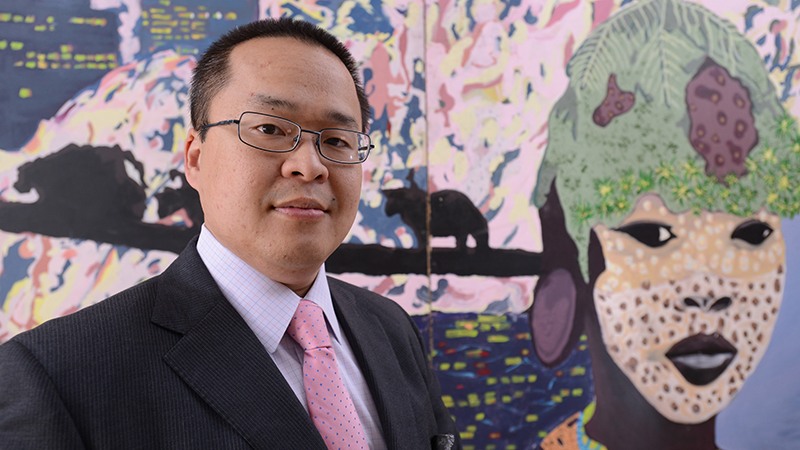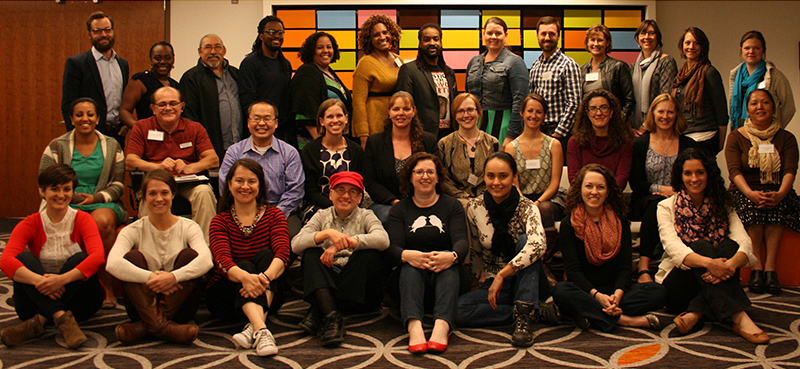Building a Strong Field of Advocates for Health Equity
Leer en español
“We’re too small to do effective change on our own. We can work together to move some of these policy changes,” says Harry Budisidharta, Deputy Director, Asian Pacific Development Center. Photo by David Cornwell
Seventeen direct-service, community organizing and policy advocacy organizations came together in 2015 to serve a common vision of health equity. The cohort of organizations are part of The Trust’s Health Equity Advocacy strategy, which aims to build a strong field of advocates.
Together, they serve the most vulnerable communities around the state, with expertise in mental and physical health issues, child care, refugee law, school discipline, criminal justice, immigration, housing and transportation, among other things. Yet few had previously worked together. Through their collaboration, they sought to build lasting ties that will help them advocate for policies to advance equity in our state.
“We are learning to work together,” says Carol Hedges, who heads the Colorado Fiscal Institute, a nonprofit that analyzes fiscal and economic data for lawmakers and advocates. “How can we complement the strengths of our organizations? How do we really make the combination of us bigger than the sum of our parts?”
With funding from The Trust, the collaborative met in various configurations throughout the year. Through a process that was driven by the grantees themselves, they built their own capacity as organizations to tackle heavy policy lifts, and also forged crucial relationships with each other.
Harry Budisidharta is deputy director of the Asian Pacific Development Center in Aurora, which serves as a kind of one-stop shop for refugees, many of them from Bhutan and Myanmar. The center provides English and citizenship classes, legal aid, physical and mental health care, and a space for ceremonial and social gatherings.
Budisidharta has contributed extensively to the collaborative, and says he has gained a lot in the process. It has been easy to find common ground with other nonprofits, Budisidharta says.
“The issues facing the refugee community for the most part are the same issues that affect lowincome populations—access to transportation, Medicaid providers, access to healthy food,” he says.
At the same time, building a strong relationship with other nonprofits has given him a chance to make sure that the issues unique to the refugee community aren’t ignored— reminding his peer organizations that most refugees need interpreters to participate in gatherings, for instance.
“Those partnerships allow us to elevate the voice of the Asian American community and also the refugee community,” says Budisidharta. “We’re too small to do effective change on our own. We can work together to move some of these policy changes we’d like to see.”
By year’s end, the cohort had homed in on short-term policy goals, including an effort to re-classify the state’s hospital provider fee as an enterprise fund and free up more state revenue for investment in schools, roads and other public services.
Just as importantly, they had embarked on a process of examining how deeply racism and other inequities had affected their own organizations and communities. By doing so, they set the stage for the long-term work of sustaining a capable field of like-minded organizations. Without strength and unity, they stand little chance of undoing generations of inequality and injustice in our state and country.
Felicia Griffin, executive director of FRESC, a Denver-based organization that advocates for housing and wage policies that benefit lowincome communities, said the year’s work crystalized the reason for the collaborative, as she sees it: “To reduce disparities, build a strong field, and make a statewide impact on folks that are really struggling and being left behind.”

The Trust’s Health Equity Advocacy grantees gather regularly to decide on shared policy goals, discover new areas of common interest and strenghten their working partnerships and relationships.
Photo by Rachel Mondragon

